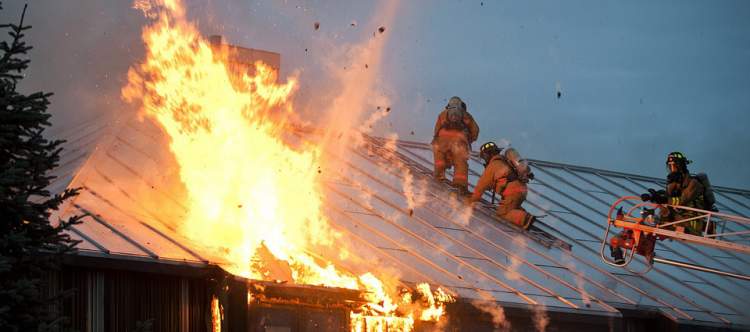
Protect your lakes area home from a winter fire with these safety tips, including statistics and advice from the National Fire Protection Association (NFPA).
A house fire is a horrible experience, but many are preventable.
The National Fire Protection Association (NFPA) says there are more than 360,000 home structure fires each year- most during the winter- resulting in about $6-8 billion dollars in damage. Here are the top 8 causes and how to prevent them:
🕯 Candles
January is one of the top months for fire caused by candles, with an average of nearly 11,000 candle fires a year according to NFPA. About one-third of these fires started in bedrooms, and more than half start because of candles that were left too close to flammable items. Other causes include leaving candles unattended or someone playing with the candles.
Safety tips:
- Never leave a candle burning near flammable items
- Never leave a candle burning in a child’s room or an unoccupied room
- Make sure candles fit securing into candle holders so they won’t tip over
- Blow out any candles before leaving a room or going to sleep
🎄 Christmas trees
Christmas tree fires are more common during the holidays, with nearly half the 230 annual tree fires occurring in January as trees dry out.
Safety tips:
- Keep live trees well-watered and dispose of them before they become dry
- Turn off tree lights before leaving the house or going to bed
- Check lights for any shorts or other electrical issues before putting them on the tree
🚬 Smoking
Regulations for creating nonflammable mattresses and clothing has reduced the number of smoking related fires, but there is still an average of 17,000 smoking related fires per year. Almost half the individuals killed in these types of house fires were 65 or older.
Safety tips:
- If you smoke, consider smoking outside
- Use wide, sturdy ashtrays to catch butts and ashes
- Look for cigarette butts under furniture and between seat cushions to make sure no lit butts have fallen someplace where they can’t be seen
- Don’t smoke in bed, when you’re tired or around medical oxygen
〽️ Dryer Fires
Clothes dryer fires happen more often than you might think – about 16,000 per year. The culprit is usually built up dryer lint or dust. Faulty wiring (which can cause fires in both washers and dryers) or a failing drive belt also account for over a third of these appliance fires.
Safety tips:
- Clean the lint screen frequently and don’t run the dryer without it
- For gas and propane dryers, make sure there aren’t any leaks in the lines
- Vent the dryer to the outside of the house and ensure nothing blocks the vent pipe
- Pull out the dryer and clean the vent pipe and the area where the screen is housed at least twice a year
- Keep the area around the dryer free of combustible materials
⚡ Lightning
While lightning accounts for about 23,000 house fires a year, these are likely to occur in the summer months.
Children playing with fire– Children start just over 7,000 house fires a year, according to the NFPA.
Safety tips:
- Keep matches, lighters and other ignition sources out of the reach of children
- Teach children fire safety at an early age
- Make sure children have adequate supervision
♨️ Cooking
The number one source of house fires is cooking, which usually involves leaving a pan unattended on the stove, mainly due to frying. 40% of all house fires, or nearly 157,000 per year, are caused by cooking.
Safety tips:
- Be alert when cooking and don’t leave food unattended
- Don’t throw water on a grease fire. Put a lid on the pan to smother the fire
- If an oven fire flares up, turn off the oven and leave the door shut until the fire extinguishes itself
- Keep clothing, pot holders, paper towels and other flammable items away from fires
- Have working smoke detectors in the house and keep a fire extinguisher nearby just in case
Most fires can be prevented with common sense. Keep in mind that from the moment a fire starts to the point where the structure is fully engulfed is usually less than two minutes, which is why it is so important to get out of the home as quickly as possible and not try to put out a large fire yourself.
Your real estate agent is the best source of information about the local community and real estate topics. Call Tom Verhelst at 218-205-2604 | Karen Zell at 218-731-6836 to learn more about local areas, discuss selling a house, or tour available homes for sale.
